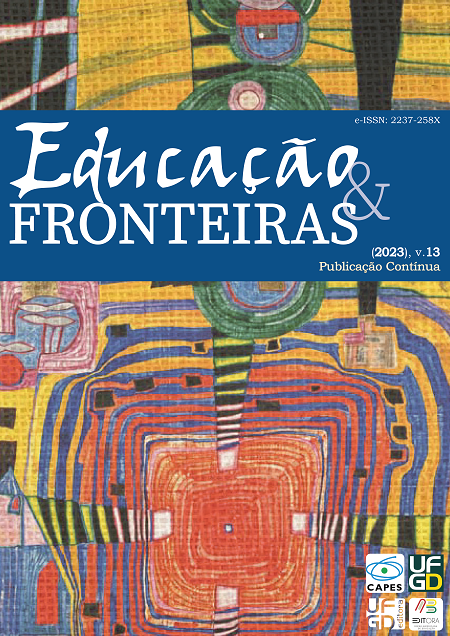Estímulos para o desenvolvimento das habilidades éticas
Uma investigação na educação fundamental
DOI:
https://doi.org/10.30612/eduf.v13i00.17156Palavras-chave:
Ética, Habilidades Éticas, Educação EscolarResumo
A educação fundamental é um momento crucial na construção dos valores em que se assentam os comportamentos sociais dos indivíduos. Assim, julga-se oportuno proporcionar uma triangulação entre os saberes que abordam o desenvolvimento das habilidades éticas e os dados obtidos no âmbito desta investigação. Reconhece-se que este acoplamento teórico poderá permitir inferências que desenvolvam novos modelos pedagógicos, que edifiquem uma sociedade mais justa e democrática. Surge assim problemática principal da pesquisa: A educação fundamental acolhe os estímulos para o desenvolvimento das habilidades éticas de seus educandos? Teve-se como objetivos específicos da pesquisa: observar, registrar e analisar, as práticas pedagógicas e os conhecimentos dos docentes sobre a ética e o desenvolvimento das habilidades éticas nas crianças. Para cumprir tais objetivos, iniciou-se com uma pesquisa bibliográfica e documental para substanciar as inferências, fizeram-se entrevistas com profissionais em efetiva docência buscando identificar os conceitos, os conhecimentos e as práticas deste grupo sobre as temáticas principais da pesquisa e refletiu-se sobre os dados obtidos, ao longo das diversas etapas, de forma analítica e metodológica. Diante da análise se chegou à conclusão de que a educação escolar pública, dentro do recorte específico, acolhe, em suas atividades pedagógicas, os estímulos para o desenvolvimento de habilidades éticas.
Downloads
Referências
BAUMAN, Z.; DONSKIS, L. Cegueira moral: a perda da sensibilidade na modernidade líquida. Rio de Janeiro: Jorge Zahar, 2014.
BONI, V.; QUARESMA, S. J. Aprendendo a entrevistar: como fazer entrevistas em Ciências Sociais. Em Tese, v. 2, n. 1, p. 68-80, 2005. Disponivel em: https://periodicos.ufsc.br/index.php/emtese/article/view/18027. Acesso em: 15 jul. 2023.
BRASIL. Presidência da República. Lei n.º 9.394, de 20 de dezembro de 1996. Estabelece as diretrizes e bases da educação nacional. Diario Oficial da União: Brasilia, DF, seção 1, p. 27833, 1996.
BRASIL. Secretaria de Educação Fundamental. Parâmetros curriculares nacionais: apresentação dos temas transversais, ética. Brasília: MEC, 1997.
BRASIL. Controladora Geral da União. Curso EAD: Educação Cidadã - Ética, cidadania e o combate à corrupção. Disponível em: http://avamec.mec.gov.br/. Acesso em: 06 jul. 2020a.
BRASIL. Ministério da Educação. Base Nacional Comum Curricular. Disponível em: http://download.basenacionalcomum.mec.gov.br/. Acesso em: 11 jul. 2020b.
CASTRO, J. P. S. R.; CASTRO, R. F. S. R.; GOMES, V. L. Dimensões acadêmicas da cegueira moral: um relato de experiência. Horizontes-Revista de Educação, [S.I], v. 7, n. 14, p. 258-272, 2019. DOI: 10.30612/hre.v7i14.10036. Disponível em: https://ojs.ufgd.edu.br/index.php/horizontes/article/view/10036. Acesso em: 15 jul. 2023. DOI: https://doi.org/10.30612/hre.v7i14.10036
COLBY, A.; KOHLBERG, L.; SPEICHER, B.; HEWER, A.; CANDEE, D.; GIBBS, J.; POWER, C. The measurement of Moral Judgement. v. 1. Cambridge: Cambridge University Press, 1987.
DAHLBERG, I. Teoria do conceito. Ciência Da Informação, [S.I], v. 7, n. 2, 1978. DOI: 10.18225/ci.inf.v7i2.115. Disponível em: https://revista.ibict.br/ciinf/article/view/115. Acesso em: 15 jul. 2023.
DURKHEIM, É. A educação moral. Petrópolis: Editora Vozes Limitada, 2012.
HARARI, Y. N. Sapiens: uma breve história da humanidade. Porto Alegre: L&PM, 2015.
MORAES, R. Análise de conteúdo. Revista Educação, Porto Alegre, v. 22, n. 37, p. 7-32, 1999. Disponível em: https://edisciplinas.usp.br/pluginfile.php/4125089/mod_resource/content/1/Roque-Moraes_Analise%20de%20conteudo-1999.pdf. Acesso em: 15 jul. 2023.
OLIVEIRA, J. C. P.; OLIVEIRA, A. L.; MORAIS, F. A. M.; SILVA, G. M.; SILVA, C. N. M. O questionário, o formulário e a entrevista como instrumentos de coleta de dados: vantagens e desvantagens do seu uso na pesquisa de campo em ciências humanas. In: CONGRESSO NACIONAL DE EDUCAÇÃO, 3., 2013. Anais [...]. [S. l.: s. n.], 2013.
PIAGET, J. O juízo moral nas crianças. São Paulo: Summus, 1948.
PUIG, J. M. Práticas morais: uma abordagem sociocultural da educação moral. São Paulo: Moderna, 2004.
WAAL, F. Primates and philosophers: How morality evolved. Princeton: Princeton University Press, 2009.
Downloads
Publicado
Como Citar
Edição
Seção
Licença
Copyright (c) 2023 Educação e Fronteiras

Este trabalho está licenciado sob uma licença Creative Commons Attribution-NonCommercial 4.0 International License.









